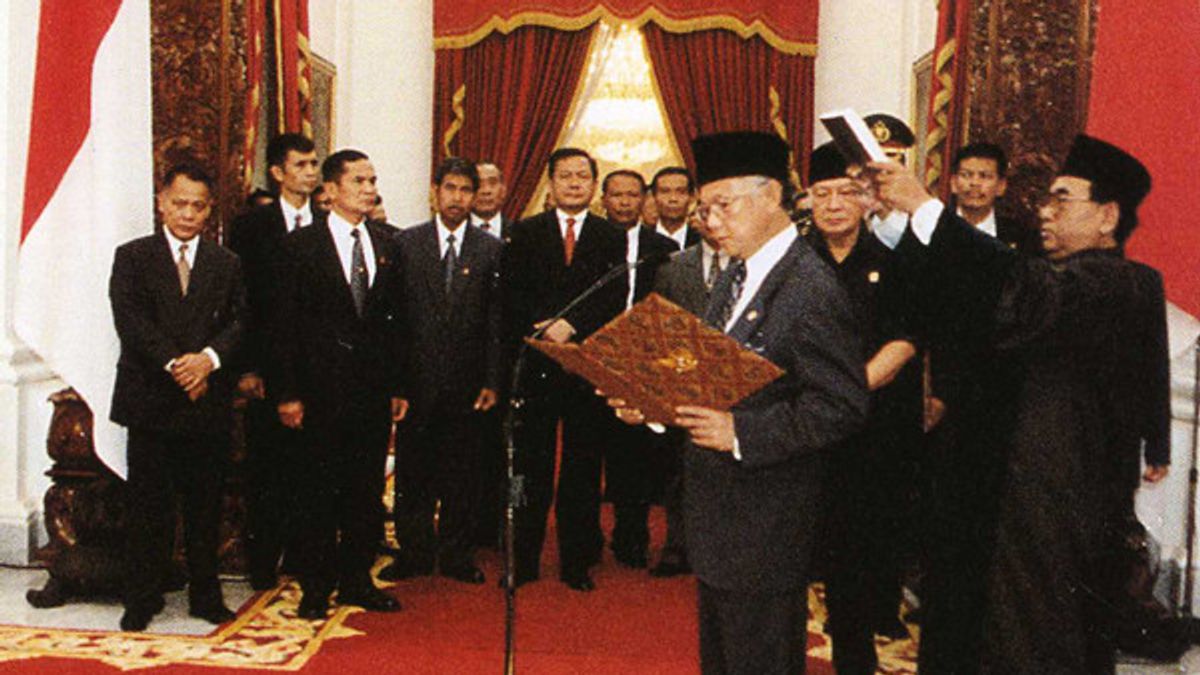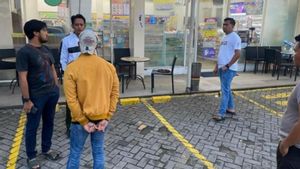JAKARTA - Economic recession 1997-1998 has also colored the gray history of Indonesia. People's daily lives are difficult, not playing. Many companies have gone out of business, termination of employment (PHK), and prices for basic commodities have soared.
Suharto could not face the situation and stepped down. Bacharuddin Jusuf Habibie tried to take control. He inflamed various policies and appeals. However, not everything makes sense. There is also a controversial one. Fasting Monday-Thursday is to save food, for example.
Indonesia is repeating history again. In the past, Soekarno's government with the Old Order was completely destroyed by a recession. Now, the Suharto government and the New Order (Orba) were also destroyed with the same problem: the economic recession. The recession storm became a big problem in 1997-1998.
People's purchasing power is reduced because of that. Moreover, the economic recession which is later called a monetary crisis is disturbing everything. Many companies have gone out of business. While those who try to survive are inflamed the option of layoffs in large numbers. To survive in the midst of a mental recession, he thought.
If examined further, the storm of the economic recession greeted it, marked by the drop in the rupiah exchange rate. The dynamics occurred because the government was deemed to have failed to anticipate the emergence of a recession. The problem added chaos when corruption among officials was so massive. While no steps have been taken to fix the problem.
In fact, many state officials underestimate the issue of the economic recession. In fact, the lifestyle of many officials living luxuriously when all Indonesian people are suffering. The demonstrations have erupted everywhere. Suharto's government, which was considered strong, collapsed instantly. People's strength was able to deplore it from the status of Indonesia's number one person.
The mutual trust between community groups has dropped to the lowest level because each group is filled with mutual suspicion and an attitude of anger that is difficult to digest common sense. Maybe not coincidentally if such a situation is triggered by the state's inability to 'localize' from the monetary crisis, the collapse of the rupiah exchange rate, and the failure of the banking sector to tackle the issue of balance of its capital and assets.
In the midst of the collapse of the state's role and the collapse of economic institutional arrangements, government intervention seems to only create new holes that are easily misused. This is due to the impact of a monetary crisis that has had an impact on the economic crisis, a decrease in people's purchasing power, and an extraordinary high poverty and unemployment rate," said Bustanul Arifin in the book Economics on Agriculture Development (2013).
Habibie was then asked to replace Suharto. He officially became President of the Republic of Indonesia on May 21, 1998. The term of government is also considered quite crucial. Because, he ruled in the transition period. Times where political pressures rain heavily on him.
The pressure is reasonable. Habibie ruled in the midst of the nation's conditions as a result of the economic recession. Even his government is having difficulty finding human resources and materials.
Habibie did not then give up. He was able to observe the problem around the state well. Many steps were taken, including his assessment of strengthening the rupiah exchange rate. Not only that, but Habibie also guarantees the existence of a democratic government. This fact can be seen clearly from the presence of press freedom to multi-party elections.
Habibie often voiced the narrative of the change through the pulpit. He often speeches about the revival of Indonesia. His speeches are often spiced with numbers and examples. Habibie's narrative was able to generate optimism.
However, once a speech was considered controversial. Habibie's appeal that invites the Indonesian people to survive in the crisis by fasting Monday-Thursday, for example.
The appeal was considered by the public as a form of the Indonesian government's inability to control the crisis. The food-saving scheme by fasting looks not good. Moreover, this thought was expressed directly from the number one person in Indonesia.
When there was a crisis period when BJ Habibie was appointed president, he advised the people to fast Monday-Thursday. Regarding fasting, BJ Habibie said he had nothing to do with a particular religion, this is a problem for cultivation. Because by fasting Monday-Thursday everyone will save 20 kilograms of rice, because every human being once eat requires 200 grams of calories in one serving of rice.
So within 52 weeks, within one year, humans save 20 kilograms. If one million people fast, they will save 20 thousand tons of rice a year. If 150 million fasts, we will save 3 million tons. This means the same as the amount of rice that we have to import," wrote A. Makmur Makka in the book Inspiration of Habibie (2020).
The English, Chinese, Japanese, Arabic, and French versions are automatically generated by the AI. So there may still be inaccuracies in translating, please always see Indonesian as our main language. (system supported by DigitalSiber.id)









